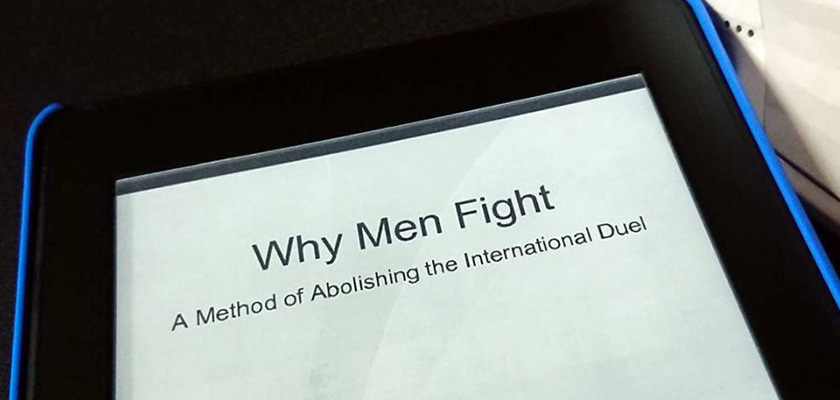This time I will look at an interesting but a bit different philosophical book – Why Men Fight (Why Men Fight: a method of abolishing the international duel) by Bertrand Russell.
As you already know, Bertrand Russell was a mathematician, logician, historian, philosopher – truly a man of many talents and of incredible intelligence. His most famous work is „Principia Mathematica “, which he wrote with Alfred North Whitehead. This post is not about that book, so I will just say that the book is an essential work in logic.
What is relevant to this book and to show you what kind of a man he was, you might find interesting that he wrote the following quote when he was only sixteen years old:

When you take all that into consideration, don’t you think it’s important to know what he had to say about why we fight among ourselves, why are we dissatisfied with our lives, why do we go to war and what can be done to reduce our violent tendencies? As an anti-war activist, it is only fitting that Bertrand Russell authored a book that tries to explain what the reasons for any fighting between humans are, not only war. It is even more important to notice that the book was written in 1916, during World War 1 and according to Wikipedia it was released in 1917 in response to devastations of WWI.
As the title says, the author was mostly trying to look at why are there wars and what can we do to prevent them in the future, but he also looked at a lot of various aspects of human life and tried to solve the human equations in a lot of fields – state, religion, marriage, property, living a fulfilled life.
Just look at the list of chapters:
- The Principles of Growth
- The State
- War as an Institution
- Property
- Education
- Marriage and the population question
- Religion and Churches
- What we can do
He starts with kind of an analysis of our nature and argues that all our activity is generated either from an impulse or desire, Impulse in his view is much more anarchical and it’s the main source of conflict – few conflicts are started either from a reason or desire as he tells us:
The war has grown, in the main, out of the life of impulse, not out of reason or desire.
Bertrand Russell
He connects our violent impulses with our beliefs which we subsequently get, such as that our own nation is above others or that our religion is the one true faith – and these beliefs can lead to stronger ones, namely that our group is the only one that matters, and you can imagine that not leading anywhere good.
Next, he touches upon the topic of the State and thinks about what the roles of the state are and should be they limited or expanded – and which powers to limit, which to expand. This is all remarkably interesting to read not only because of the matter at hand but because it shows that our debates about powers of the state are nothing new, they have been going on for a long time. Remember, the book was first printed over a hundred years ago.
Russell then continues to look at another factory of the society, like education, property, marriage, and religion. His criticism of the professional clergy and his opinion that priests should be doing religious work out of the goodness of their hearts and not because they desire to be paid. in other words, he argues that religion would be in a far better position to teach morality if it were done by people who have other jobs.
If religion is not to be harmful in a world of rapid change, it must […] be carried on by men who have other occupations […] who do their religious work from enthusiasm, without receiving any payment.
Bertrand Russell
So, as you can see, the book is great not because it criticises – anyone can criticise – but because it offers solutions. That is what sets it apart from all the other books who only point the flaws of anything, really, not only religion but offer no solutions or alternatives. Because this book has detailed suggestions and thoughts about how we are to organize these fields – education, religion, state etc., the book is for everyone who wishes to improve the world we live in. Because it touches bout upon individuals and institutions, it offers something to think about to everyone. And even if it is a bit old now, it is still from time to time a revelation.
Be warned, however, that even though he is considered a progressive, the book is old, so some language might seem a bit old fashioned and even slightly sexist to you, but this is not intentional, the spirit of times was simply different then. Other than that – which is not really his fault – people were simply not ‘woke’ then – his writing style is friendly to readers, and you do not have to know even a little bit about philosophy to follow along. All ideas are communicated clearly, and you will have an enjoyable time reading it.
Because it’s an old book you might be able to find it online legally for free. Just please make sure that it’s really in public domain in your country so you do not get into trouble. If it’s not in the public domain in your country, you can get it for free very cheaply.

